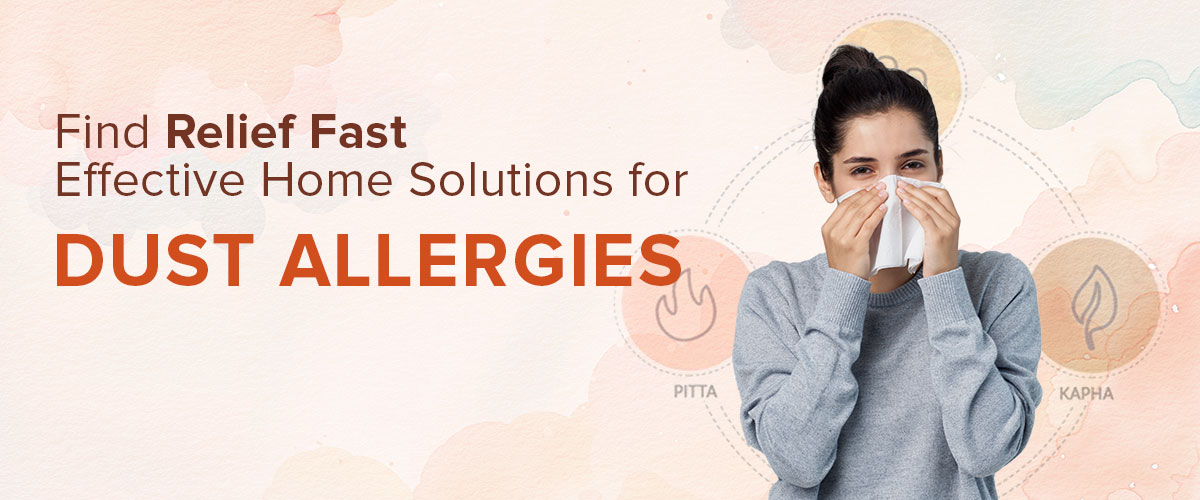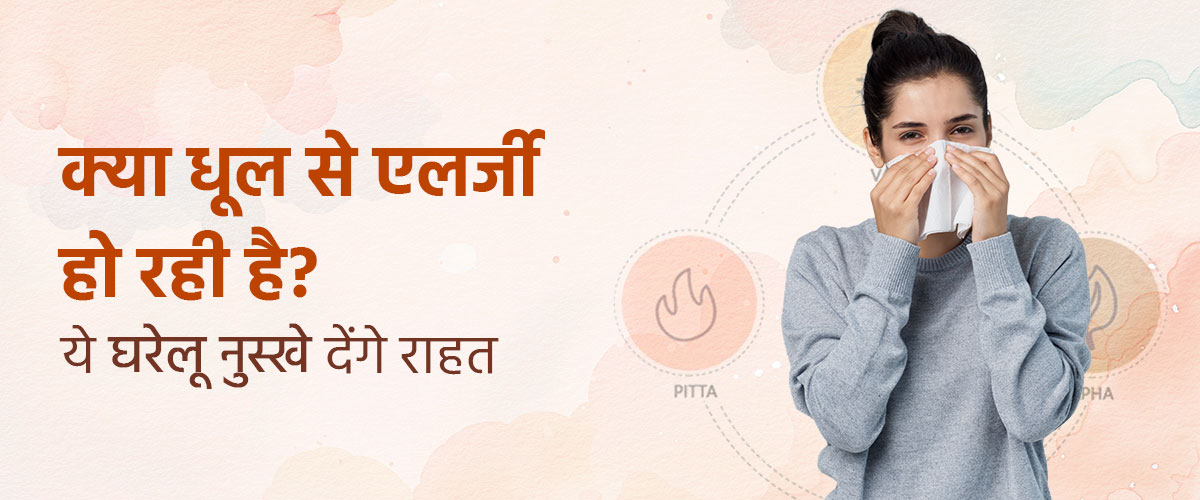Home Remedies for Dust Allergy

Dust allergies might seem like a small issue, but for many people around the world, they can disrupt daily life and lead to serious health problems. Dust allergies can trigger symptoms ranging from slight irritation to severe respiratory problems. To put it simply, a dust allergy is the body's immune response to minute particles in our environment.
The discomfort related to these allergies might hinder day-to-day activities and hamper quality of life. Understanding the primary causes of dust allergies and home remedies to manage symptoms can help us lead healthier lives. These measures not only help to handle the immediate effects of dust allergies but also help to maintain a cleaner living environment that is free from allergens.
What is Dust Allergy?
A dust allergy occurs when the immune system reacts disproportionately to certain foreign substances & elements in dust. The allergy is nothing but a reaction caused by dust mites that thrive in household dust. These mites feed on organic material like skin flakes and flourish in warm and humid conditions.
The signs associated with a dust allergy include sneezing, itchy eyes, coughing, runny nose, etc. These reactions represent a defensive response of the immune system to perceived dangers. Dust allergies are widespread, impact health and comfort, and require appropriate management.
What Causes Dust Allergy?
Dust allergies are mainly caused by tiny components in household dust, which stimulate the immune system to react. These allergens are present in every indoor environment and differ from household to household. Identifying the factors that result in dust allergies will help manage the symptoms of these allergies.
Dust Mites: The primary reason for dust allergies is dust mites, tiny creatures that are not noticeable to the naked eye. They like warm and humid environments & feed on the dead skin cells that humans shed daily. Their waste products are highly allergenic, which may result in allergic reactions when inhaled.
Pet Dander: The tiny flakes of skin that pets shed frequently can also cause dust allergies. They're called dander. They are sticky and can adhere to furniture, bedding and other surfaces in the house. Even homes without pets pose a risk for allergies, as the dander could be brought in from outside environments.
Pollen: Pollen is typically associated with outside allergies, but can also be considered a major indoor allergen when introduced into the house through open windows, doors, clothing, etc. It can get easily mixed with household dust and can trigger allergic reactions year-round.
Mould Spores: Growth and development of mould in damp areas of the house could release spores into the air (which become part of the household dust). These spores may result in allergic reactions, particularly in moist climates or poorly ventilated homes.
Home Remedies and Tips
Managing dust allergies effectively requires active measures to reduce exposure to allergens. Listed here are a few home remedies and advice for any person affected by dust allergens.
Steam Inhalation: Inhaling steam moistens the nasal passages and throat. This in turn reduces congestion and coughing. You can inhale the steam coming from a pot of warm water or take a hot shower to open up your airways. For best results, you should do steam inhalation before bedtime.
Honey: Take 1 tablespoon of honey daily to help your body build a tolerance to the local pollen, which triggers your allergy symptoms. Honey has anti-inflammatory properties and soothes sore throats.
Herbal Teas: Herbal teas (chamomile or peppermint) could ease dust allergy symptoms. Peppermint tea acts as a natural decongestant, and chamomile tea has anti-inflammatory and antioxidant effects that soothe irritated mucous membranes.
Essential Oils: Eucalyptus oil, peppermint oil, tea tree oil, and other essential oils help open up sinuses and clear mucus. Eucalyptus oil helps clear nasal passages and bronchial congestion. You can use these essential oils in a diffuser or add a few drops to a steam inhalation routine.
Bromelain: Bromelain (found in pineapples) is an enzyme that can ease nasal swelling and thin mucus. It also reduces respiratory irritation associated with dust allergies.
Stinging Nettle: Stinging nettle has natural antihistamine and anti-inflammatory properties. It's readily available as capsules, tinctures, or teas and could ease symptoms of allergies by preventing histamine production in the body.
Apple Cider Vinegar: Apple cider vinegar has many health benefits. It helps to reduce mucus production and cleanse the lymphatic system. You can mix 1 tablespoon of apple cider vinegar in a glass of water and drink it daily.
Butterbur: Butterbur is a herb that acts as a leukotriene inhibitor-like substance. This substance is usually found in allergy drugs. It might ease nasal symptoms (sneezing, itchy eyes, sinusitis, and headaches).
Vitamin C with Bioflavonoids: Vitamin C boosts immunity and has antihistamines. Taken with bioflavonoids (which boost the absorption of vitamin C), it becomes more impactful in lessening the severity of allergies. Bioflavonoids are present in citrus fruit and blackcurrants.
Liquorice Root: Liquorice root has anti-inflammatory properties that can soothe swollen and irritated nasal passages and throats. It can also be consumed as tea. People with high blood pressure should be cautious when consuming liquorice root, as it can affect sodium and potassium levels in their bodies.
Green Tea: Green tea contains a compound called EGCG (epigallocatechin gallate). EGCG blocks the key cell receptor involved in producing an allergic response. You can drink 2 cups of green tea daily to modulate the body's reaction (to dust and other allergens).
Lifestyle Recommendations
Several lifestyle modifications might help manage the symptoms of dust allergy by reducing contact with allergens. A few lifestyle adjustments that can help include:
Improve Cleaning Habits: Clean your house frequently with techniques that reduce dust movement, like capturing dust with a wet cloth or mop without distributing it into the air.
Optimise Your Living Space: Keep furniture and decor easy to clean to minimise dust accumulation. You can use roll-up shades rather than using curtains or heavy drapes that collect dust.
Control Indoor Climate: Use dehumidifiers to maintain low humidity levels in your home. It prevents dust mite proliferation. Close windows during high pollen seasons to prevent outdoor allergens from entering your house.
Diet for Dust Allergies
Certain foods can strengthen your immune system and ease allergy symptoms. Here are some food items you should include and avoid:
Incorporate Anti-Inflammatory Foods: Add foods loaded with omega-3 essential fatty acids (salmon, flaxseeds, walnuts) to fight inflammation. Eat plenty of fruits (berries, oranges, etc.) and vegetables, which are rich in vitamins and antioxidants.
Stay Hydrated: Drinking plenty of fluids can help thin mucus, making it easier to expel and reducing nasal congestion. Herbal teas (especially green tea) have natural antihistamines that soothe allergy symptoms.
Avoid Foods That Trigger Histamine Production: Several foods and drinks (aged cheeses, processed meats, and alcohol) raise histamine levels in the body and worsen allergy symptoms. Be mindful of these triggers and limit their consumption during allergy season.



 Prev
Prev

































































